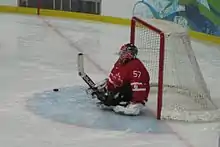Paul Rosen
Paul Rosen (born April 26, 1960) is a Canadian ice sledge hockey goalie and motivational speaker from Thornhill, Ontario.[1] Rosen suffered a leg injury during a hockey game as a youth, and the resulting damage, infections and pain to his leg plagued him for years until his lower leg was amputated at age 39. During rehabilitation, Paul turned his sights towards sledge hockey, made the Canadian National Sledge hockey team, and participated in the 2002 and 2006 Winter Paralympics. Rosen was the oldest rookie in the history of the Paralympic Winter Games when he made his debut at 41.[2] At the 2006 Games in Torino, Rosen and the Canadian team won the sledge hockey gold medal.[3]
| Paul Rosen | |||||||||||||||||||||||||
|---|---|---|---|---|---|---|---|---|---|---|---|---|---|---|---|---|---|---|---|---|---|---|---|---|---|
 Rosen in 2015 | |||||||||||||||||||||||||
| Born |
April 26, 1960 Toronto, Ontario, Canada | ||||||||||||||||||||||||
| Height | 6 ft 0 in (183 cm) | ||||||||||||||||||||||||
| Weight | 189 lb (86 kg; 13 st 7 lb) | ||||||||||||||||||||||||
| Position | Goalie | ||||||||||||||||||||||||
| National team |
| ||||||||||||||||||||||||
| Playing career | 2001–2010 | ||||||||||||||||||||||||
|
Medal record
| |||||||||||||||||||||||||
In January 2007, Rosen made headlines across Canada when his Paralympic gold medal was stolen during an autographing session with fans in Toronto. After commentator Don Cherry told the thief to drop the gold medal in a mailbox during his Hockey Night in Canada broadcast, the medal turned up at a postal sorting station in Toronto and was returned to Rosen.[4] He announced his retirement from the Canadian ice sledge hockey team on September 7, 2010 (along with captain Jean Labonte, Todd Nicholson and Herve Lord).[5]
Of note, Rosen also competed in sitting volleyball, another disabled sport. He became a member of Canada's sitting volleyball team at the 2007 Parapanamerican Games in Rio de Janeiro, Brazil. Rosen was part of the first official international match for Canada's sitting volleyball team when they played the United States on August 15, 2007.[6]
After retiring from competitive sports, Rosen became an official ambassador and spokesperson for National Benefit Authority.[7][8] When Rosen turned 50, he revealed that he had struggled with literacy his whole life and was going back to school. He then became an ambassador for ABC Life Literacy, to help people conquer the shame and stigma of illiteracy.[9]
Sledge hockey stats

Rosen spent nine seasons with the Canadian national ice sledge hockey team. By the end of his career, he accumulated a won loss record of 55-15-1. In addition, he registered a 1.04 goals-against average and 25 shutouts in 72 career games.
Hockey Canada[10]
| Year | Event | GP | MIN | GA | SO | GAA | W | L | T |
| 2007 | World sledge hockey challenge | 4 | 153 | 4 | 1 | 1.57 | 4 | 0 | 0 |
| 2008 | World sledge hockey championships | 2 | 90 | 0 | 2 | 0.00 | 2 | 0 | 0 |
| 2009 | World sledge hockey championships | 3 | 141 | 3 | 2 | 1.28 | 2 | 1 | 0 |
References
- "Paul Rosen". paralympic.ca. Archived from the original on 24 February 2014. Retrieved 6 December 2019.
- "Paul Rosen". Archived from the original on 2012-03-27. Retrieved 2011-09-17.
- Results for paul rosen from the International Paralympic Committee (archived)
- Hunter, Paul (5 December 2019). "He won hockey gold, then became a motivational speaker. But Paul Rosen's dark secrets nearly killed him | The Star". thestar.com. Toronto Star. Retrieved 6 December 2019.
- "4 Canadian sledge hockey vets retire". cbc.ca. 7 September 2010. Retrieved 6 December 2019.
- "Canada's sitting volleyball team makes official international debut August 15". Archived from the original on 2012-03-27. Retrieved 2011-09-17.
- "Paul and the National Benefit Authority | Paul Rosen". Paul Rosen. Retrieved 2015-12-24.
- Network, Postmedia. "Disabled Canadians find ally in National Benefit Authority". Toronto Sun. Retrieved 2016-03-27.
- "Facts and Research | ABC Life Literacy Canada". abclifeliteracy.ca. Retrieved 2015-12-24.
- "Player Profile - Paul Rosen". www.hockeycanada.ca. Archived from the original on 9 June 2011. Retrieved 6 December 2019.
